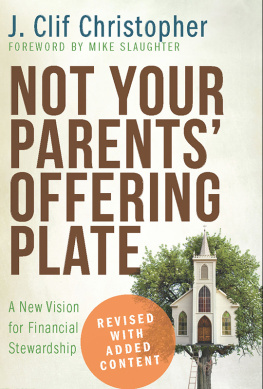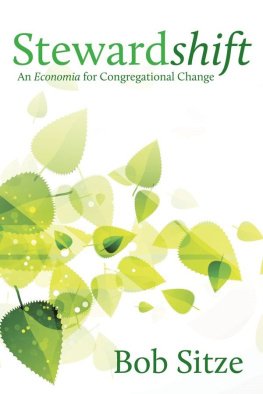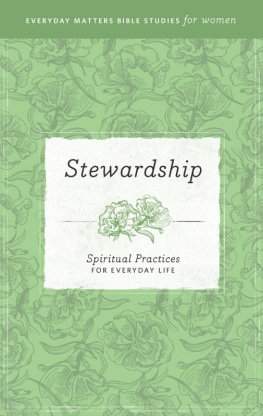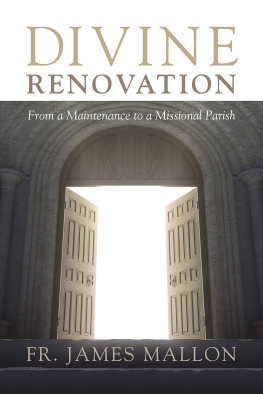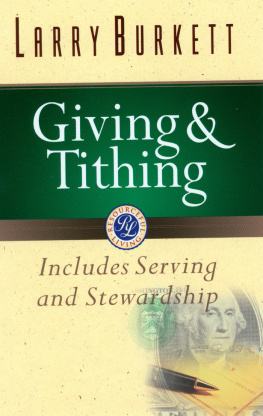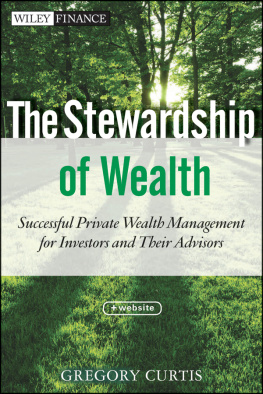Charles E. Zech - Best Practices in Parish Stewardship
Here you can read online Charles E. Zech - Best Practices in Parish Stewardship full text of the book (entire story) in english for free. Download pdf and epub, get meaning, cover and reviews about this ebook. year: 2008, publisher: Our Sunday Visitor, genre: Home and family. Description of the work, (preface) as well as reviews are available. Best literature library LitArk.com created for fans of good reading and offers a wide selection of genres:
Romance novel
Science fiction
Adventure
Detective
Science
History
Home and family
Prose
Art
Politics
Computer
Non-fiction
Religion
Business
Children
Humor
Choose a favorite category and find really read worthwhile books. Enjoy immersion in the world of imagination, feel the emotions of the characters or learn something new for yourself, make an fascinating discovery.

- Book:Best Practices in Parish Stewardship
- Author:
- Publisher:Our Sunday Visitor
- Genre:
- Year:2008
- Rating:3 / 5
- Favourites:Add to favourites
- Your mark:
- 60
- 1
- 2
- 3
- 4
- 5
Best Practices in Parish Stewardship: summary, description and annotation
We offer to read an annotation, description, summary or preface (depends on what the author of the book "Best Practices in Parish Stewardship" wrote himself). If you haven't found the necessary information about the book — write in the comments, we will try to find it.
Best Practices in Parish Stewardship — read online for free the complete book (whole text) full work
Below is the text of the book, divided by pages. System saving the place of the last page read, allows you to conveniently read the book "Best Practices in Parish Stewardship" online for free, without having to search again every time where you left off. Put a bookmark, and you can go to the page where you finished reading at any time.
Font size:
Interval:
Bookmark:
Best Practices in
PARISH
STEWARDSHIP
Best Practices in
PARISH
STEWARDSHIP

CHARLES E. ZECH
Villanova University
Center for the Study of Church Management
Our Sunday Visitor Publishing Division
Our Sunday Visitor, Inc.
Huntington, Indiana 46750
The Scripture citations used in this work are taken from the Catholic Edition of the Revised Standard Version of the Bible (RSV), copyright 1965 and 1966 by the Division of Christian Education of the National Council of the Churches of Christ in the United States of America. Used by permission. All rights reserved.
Every reasonable effort has been made to determine copyright holders of excerpted materials and to secure permissions as needed. If any copyrighted materials have been inadvertently used in this work without proper credit being given in one form or another, please notify Our Sunday Visitor in writing so that future printings of this work may be corrected accordingly.
Copyright 2008 by Our Sunday Visitor Publishing Division,
Our Sunday Visitor, Inc. Published 2008
12 11 2 3 4 5 6 7 8 9
All rights reserved. With the exception of short excerpts for critical reviews, no part of this work may be reproduced or transmitted in any form or by any means whatsoever without permission in writing from the publisher. Write:
Our Sunday Visitor Publishing Division
Our Sunday Visitor, Inc.
200 Noll Plaza
Huntington, IN 46750
ISBN: 978-1-59276-492-1 (Inventory No. T731)
LCCN: 2008931957
Cover design by Rebecca J. Heaston
Interior design by Sherri L. Hoffman
PRINTED IN THE UNITED STATES OF AMERICA

CONTENTS
Chapter One

INTRODUCTION
Most Catholics are surprised to learn that, compared to their Protestant friends, they rank very low in terms of their support for their Church. Beginning with Fr. Andrew Greeleys path-breaking 1987 study of Catholic financial giving, nearly every study of the topic has found that, on a percentage of income basis, Catholics contribute only about half as much to their Church as do Protestants. Most studies reveal that the typical Protestant household contributes in the range of 2 to 2.4% of their income to their church, while Catholic households contribute from 1 to 1.2%.
What does this mean in practical terms? It means that if Catholic households contributed at just the same rate as their Protestant friends, the same 2 to 2.4% of their income (were not even talking about tithing here), the U.S. Catholic Church would receive something in the area of $7 billion a year more in annual revenues. This translates into about $400,000 per year for the average parish. What could a parish do with an additional $400,000 every year? Think of the deferred maintenance on the parish grounds that could be addressed. Think of the community outreach that the parish could perform. Think of improving on the scandalously low salaries that we currently pay our lay professional staffs. The list goes on.
But the news gets even worse. Not only are Catholics low financial givers, they also trail their Protestant friends in the amount of time they volunteer to their parishes. A study by Hoge et al. (1998) shows that the average Catholic household volunteered 1.6 hours per week to their church, while the average Protestant household in the study volunteered 3 hours per week again, a two-to-one ratio.
What are the causes for the low giving, both in financial terms and as measured by volunteer time, that Catholic parishes receive from their parishioners? A number of studies are reviewed in that cite various reasons. But the fact of the matter is that introducing stewardship is probably the one best thing that a parish can do to increase members contributions of their time, talent, and treasure.
The Meaning of Stewardship
The theology behind stewardship, as presented in the Bible, is straightforward. The master has departed on a trip and left the steward in charge. When he returns, the master asks for an accounting from the steward: What have you done with what I entrusted to you? The message is that all creation is a gift. Each of us has been entrusted with gifts, in the form of our time, talent, and treasure. Someday we will be called to give an accounting of how we used those gifts to advance the kingdom of God.
A number of thoughts come up frequently to describe stewardship:
All we have is really a gift from God, Who asks us to return a portion in the form of our time, talent, and treasure to support His work on earth.
Stewardship involves developing a need to give, rather than merely giving to a need.
Stewardship is an understanding of a total way of life; a conversion of mind and heart.
Stewardship is not about something we do, it is about who we are, and Whose we are.
Stewardship is about asking ourselves, What do we own, and what owns us?
Stewardship is an act of worship, not an act of obligation.
In fact, stewardship is so much about what we as a Church should be preaching anyway that, even if the Church were flush with money and volunteer time, we should still emphasize the stewardship message.
In 1992, recognizing the emerging practice of stewardship at the time, the U.S. Catholic bishops thought it imperative to emphasize its theological foundations. They released a pastoral letter, Stewardship: A Disciples Response. As the title indicates, stewardship is part of the Christian vocation of discipleship initiated at Baptism. As such, it is integral, not optional. Further, it calls on Catholics to be outward-focused, intent on serving all of humanity, but especially those with the greatest need. The bishops recognize that stewardship is costly and demanding to practice; in many ways, it is countercultural.
One reason why the bishops chose a theological, rather than prescriptive, approach to stewardship was to counter the notion that stewardship is only about money. This was partly in response to the common practice at the time (and still frequently employed today) of discussing stewardship once per year in the parish, in conjunction with a financial report and an appeal to parishioners to be generous so that the parish can meet its budget. The bishops hoped to make clear that stewardship is not a fundraising gimmick, but rather a spiritual conversion of mind and heart.
One of the primary supporters of stewardship in the United States has been the International Catholic Stewardship Council. Founded in 1962 as the National Catholic Stewardship Council (its subsequent name change reflected the reality of its membership), the primary goal of the ICSC has been to promote the concept of Christian stewardship. It does this through a number of venues, including the preparation and dissemination of stewardship materials, sponsorship of annual and regional conferences, and an Institute for Stewardship Development.
Through its programs, the ICSC offers both a vision of stewardship and practical aids to attain that vision. One such aid is its recently developed definition of stewardship, contained below in .
TABLE 1.1
International Catholic Stewardship Conference
Stewardship Definition
Stewardship is a way of living out our faith as individuals, as a faith community, indeed in the actions of our daily lives. Parish Stewardship refers specifically to those actions and attitudes that directly affect our parish community.
 First, as individuals, we strive to become Christian stewards as defined in the U.S. Bishops Pastoral Letter,
First, as individuals, we strive to become Christian stewards as defined in the U.S. Bishops Pastoral Letter,
Font size:
Interval:
Bookmark:
Similar books «Best Practices in Parish Stewardship»
Look at similar books to Best Practices in Parish Stewardship. We have selected literature similar in name and meaning in the hope of providing readers with more options to find new, interesting, not yet read works.
Discussion, reviews of the book Best Practices in Parish Stewardship and just readers' own opinions. Leave your comments, write what you think about the work, its meaning or the main characters. Specify what exactly you liked and what you didn't like, and why you think so.

